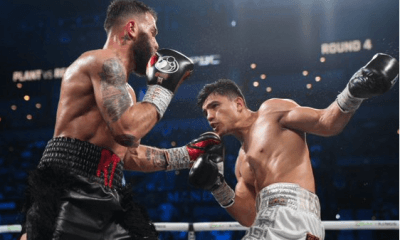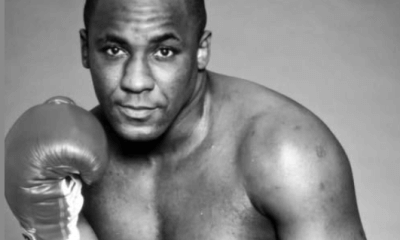Articles of 2009
Campbell Blows First Title Defense On Scale
Nate Campbell forgot.
Barely 24 hours after insisting he would never forget all the struggles he’d endured before he became lightweight champion 11 months ago, Campbell failed to make the 135-pound limit Friday night, thus losing without a fight the unified titles he’d struggled so many years to win.
In a sad irony, Campbell said just a day earlier that he knew he was an inspiration for all the struggling fighters out there who felt they never get a break because his did not come until he was 36 years old. That was the night he upset then unified champion Juan Diaz 11 months ago and appeared to turn around what had been a hardscrabble life.
But his next bout, which was supposed to pay him $300,000, was cancelled last summer when Joan Guzman ironically failed to make weight himself and then refused to fight Campbell at all. By the time he finally got someone to the scales, No. 1 IBF contender Ali Funeka, it turned out it was now Campbell who would fail himself and his professional obligations when he weighed in at three pounds over the 135-pound limit Friday after having spent the past two days baking himself dry in a sauna with few positive results.
He was given two hours to get down to the lightweight limit but upon his return he’d lost only a half pound and so was stripped of the IBF title that was at stake. With the WBA belt already gone due to boxing politics and the WBO belt likely to be stripped away as well, Campbell was left with what he’s had most of his life – nothing but his two fists, which he’ll use tonight on Funeka so that he at least earns the $240,000 payday he contracted for even though only Funeka has a chance to leave the ring as IBF lightweight champion.
“I did everything I could to make it,’’ Campbell insisted. “I feel like its unprofessional (of him) but I can’t do it any more. I’m 36 now and I just couldn’t do it. I thought the last couple pounds would come off easily but they didn’t.’’
Campbell then said the obvious – that he’d move up to 140 pounds to begin campaigning as a junior welterweight – but the sad fact is he very likely blew his one chance to change his life. Had he defeated Funeka and retained his title belts he would have been able to demand a larger purse as unified champion in his next outing or move up then to 140 and very likely instantly become the No. 1 contender in at least one of the four major sanctioning bodies’ ratings.
Now, at nearly 37, he’s back to where he’s been most of his career, which is in limbo. The irony is that 24 hours earlier Campbell talked at some length about how he would not fall into the trap that had cost so many other fighters over the years when long layoffs slow down their progress.
By Saturday night Campbell will have fought only once in the past 19 months, the kind of inaction that has in the past caused many other Don King promoted fighters to lose their resolve and dissipate themselves.
Campbell insisted that would never happen to him because, as he put it, “I tell fighters all the time that come to me when their career isn’t going right to just keep fighting. Keep working. Keep being you. This is a job. You got to go to work every day if you want to retire with benefits.’’
Apparently he failed to take his own advice. Although he and his chief advisor Terry Trekas both claim Campbell had a good training camp and that the problem was that his aging body simply shut down and refused to take him back to 135 pounds after so long away from that weight, those words rung hollow.
It was a weight Campbell has been making most of his career. Only now, with the trappings of success around his waist even as he filed for bankruptcy after the Guzman fight collapsed, he suddenly is unable to do it?
What is more likely is that he simply was no longer able to push himself and deny himself with the same urgency he had before becoming a world champion and then seeing it lead only to bankruptcy and three belts he couldn’t seem to transform into a life-altering payday.
Considering where he started from Campbell’s insistence that he would not follow in the failed footsteps of so many before him who suffered the same fate of sudden success followed by inaction and then personal failure seemed poignant and believable.
He had grown up living in 15 different homes after his father’s alcoholism forced him to turn his then seven-year-old son over to the Jacksonville, Fla. foster care system for a decade. At the age of 18 he was an under-educated father working two and three low-paying jobs to make ends meet, a young man headed in a lot of directions but none likely to lead to the world championship of anything.
Then, at 24, Campbell found his calling one night in a Winn-Dixie warehouse in Jacksonville when a white man challenged him to use a talent he didn’t even know he possessed. That evening, while working the 11 p.m. to 7 a.m. shift cutting boxes open, a co-worker watched Campbell shadow box, as he often did to entertain himself during lulls in the wee hours. The man told Campbell to stop wasting what seemed obvious boxing skills and take the risk to be great.
The age of 24 is no time to start a boxing career but Campbell was coerced into it by that challenge. Three years later he turned professional and nine years and several stops and starts later he was one of the most unlikely world champions in boxing history. It is a story that has fortified him and hundreds of fighters who know it, a story he credited with preventing him from slipping into the abyss of a post-championship lethargy fueled by inactivity that could strip those titles from him faster than Ali Funeka could.
“Every day I think of those days at Winn-Dixie,’’ Campbell said. “That’s why I didn’t get down on myself after Guzman fell out. I was ready to fight, he wasn’t. That’s what my job is. It’s to be ready to fight regardless. What was I supposed to do? Quit training. I know if I’m not ready what will happen. I remember those days.’’
“Those days’’ were long ones with little money, less hope and a string of jobs to try and make ends meet. Now all he had to do was one job but when it seemingly counted most he couldn’t bring himself to do it one more time.
“I don’t know why it took so long for me to get a chance to win the title,’’ Campbell (32-5-1, 25 KO) said the day before he lost it without a fight. “Maybe it was because I didn’t have that backing with me (that he now has from promoter Don King). I don’t think I’m the only talented fighter out there who nobody knows. There are tons of guys with talent like me. I see them all the time.
“Every where I go I hear I’m their inspiration. They look at me and believe they can still do it. It was a long time coming but I tell them remember this is a job and show up every day regardless.’’
When asked what he had done in the long months since the Guzman fight failed to materialize Campbell said loudly, “Train. That’s what fighters are supposed to do. I didn’t look at the belts. This is not about trinkets. It’s about becoming the very best fighter I can and making some money.’’
That’s what it was supposed to be about Saturday night on HBO but that train left the station the minute Nate Campbell stepped on those scales the second time Friday night and they barely moved eight ounces. Perhaps he had trained as much as he’d said but you had to wonder if this was just another guy for whom success was harder to cope with than the absence of it had been.
Campbell understood the risk of 11 month layoffs and fighting once in over a year and a half. He knew there is a dullness that can develop from that, an erasing of desire and a loss of hope and faith that hard work equals success.
He claimed to have avoided that pitfall, although the story was truly told only when he and Funeka stood at the scales. One made it. The other did not. Without a punch being thrown, Nate Campbell had been dethroned, a champion felled by a fork.
“Did I do enough?’’ Campbell said the day before the weigh-in. “We’ll find out Saturday night.’’
Turned out we didn’t have to wait that long.
-

 Featured Articles4 weeks ago
Featured Articles4 weeks agoA Night of Mismatches Turns Topsy-Turvy at Mandalay Bay; Resendiz Shocks Plant
-

 Featured Articles2 weeks ago
Featured Articles2 weeks agoAvila Perspective, Chap. 330: Matchroom in New York plus the Latest on Canelo-Crawford
-

 Featured Articles1 week ago
Featured Articles1 week agoVito Mielnicki Jr Whitewashes Kamil Gardzielik Before the Home Folks in Newark
-

 Featured Articles4 weeks ago
Featured Articles4 weeks agoRemembering the Under-Appreciated “Body Snatcher” Mike McCallum, a Consummate Pro
-

 Featured Articles4 weeks ago
Featured Articles4 weeks agoAvila Perspective, Chap 329: Pacquiao is Back, Fabio in England and More
-

 Featured Articles3 weeks ago
Featured Articles3 weeks agoOpetaia and Nakatani Crush Overmatched Foes, Capping Off a Wild Boxing Weekend
-

 Featured Articles3 weeks ago
Featured Articles3 weeks agoFabio Wardley Comes from Behind to KO Justis Huni
-

 Featured Articles2 weeks ago
Featured Articles2 weeks agoCatching Up with Clay Moyle Who Talks About His Massive Collection of Boxing Books















